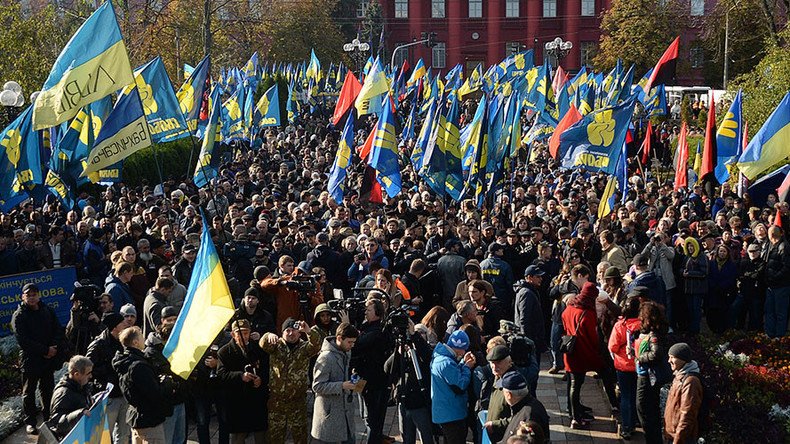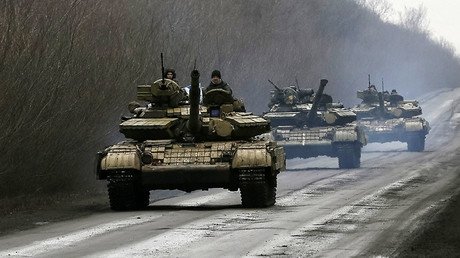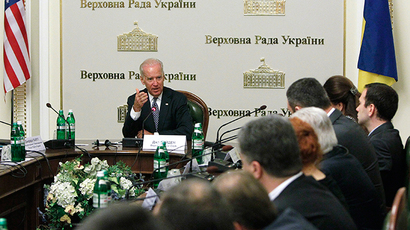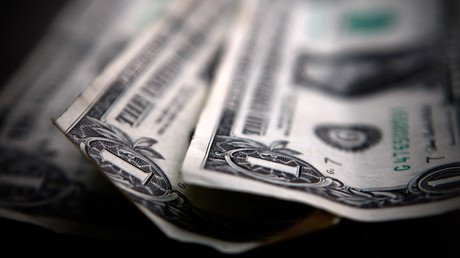Saving Poroshenko? US State Dept offers $800k to Ukraine NGOs

Washington is offering a grant of up to $800,000 to Ukrainian public organizations that will monitor regional authorities and secure ties with local media. Political analysts say it’s a way to keep President Petro Poroshenko in power amid declining popularity.
“[The] goal is to enhance the accountability and responsiveness of the Ukrainian government at the local level through civil society advocacy, monitoring, and civic activism,” reads a US State Department funding announcement, published this week on the grants.gov website.
It explains further that the State Department is looking for “civil society organizations,” either non-profit or for-profit (with some conditions) that will provide proposals “to perform a watchdog function and advocate for democratic governance” in Ukraine.
The description states the program is aimed at increasing civic activism in Ukraine at a local level and building and training a network of civic activists throughout the country. These in turn are to keep watch on the activities of local governments and encourage partnerships between civil society and media “to communicate important information about local reforms to the public.”
The organizations applying for the grant must present a program for their activities, along with a financial plan, by January 17, 2017. They are also required to have ties with “thematic or in-country partners, entities and relevant stakeholders, including private sector partners and NGOs” and provide proof of these links or their potential development.
The description states that applicants are also requested to have “demonstrable experience in administering successful, and preferably similar, projects.”
It adds that: “Projects should have the potential to have an immediate impact leading to long-term sustainable reforms, and should have potential for sustainability beyond DRL (Bureau of Democracy, Human Rights and Labor of the State Department) resources.”
READ MORE: Ukrainian Maidan coup leaders must testify before court – ousted President Yanukovich
Among other things, the bureau says it welcomes projects that “advance the rights and uphold the dignity of the most vulnerable or at-risk populations,” with one of the criteria for the selection of candidates being their cooperation with minority groups.
The State Department reserves a significant role for itself in the implementation of the program that receives the grant. It will, for instance, demand quarterly reports on the program’s spending and progress.
'Chance to keep Poroshenko at helm' – experts on funding grant
Experts believe that this and other such funding opportunities Washington has offered Ukraine are a means of preventing the fall of the country’s president and Washington favorite, Petro Poroshenko. The Ukrainian leader’s public approval ratings have plunged recently.
According to Liga.Net, in November Poroshenko’s rating drew 14.3 percent of popular support – having plummeted to a low of 10.7 percent in summer. He is still behind former Prime Minister Yulia Tymoshenko in the ratings.
Speaking to RT Russian, political analyst Nikolay Shlyamin said: “The activists who will work in the country under this program and for the money from this grant will penetrate [Ukraine’s] state agencies to monitor the spending of officials and then publish reports on the expenditures from the state budget.
“In addition, they will attract the media who will cover the process of fighting against corruption in the country. In this case, there is a chance that the Americans will be able to keep their favorite at the helm for the upcoming presidential elections,” Shlyamin believes.
He notes that the Ukrainian people have become disillusioned with Poroshenko's leadership, with his promises to introduce visa-free travel with the EU and eradicate corruption proving a failure.
“Under Poroshenko, Ukraine has so far been unable to secure European Union and NATO membership. In domestic policy [there have been] also continuous failures,” Shlyamin told RT Russian.
He believes the current grant is one of the final efforts by US President Barack Obama’s administration to maintain US-Ukraine relations as they have been since the coup in 2014.
“Obama will soon leave office. Therefore, he needs to have time to allocate the necessary financial resources to continue the current policy and prevent future president Donald Trump from building a new line of cooperation with Ukraine,” he says.
Some, like film director Oliver Stone, have called the Maidan revolution of 2014 a US-staged coup, while former US Congressman Ron Paul called on foreign actors - like Washington, NATO or Moscow - to stay out of the country.
READ MORE: Coups for export: US has history of supporting anti-govt upheavals
In 2015, Sputnik news agency reported that the National Endowment for Democracy (NED) – a bureau much like the DRL, which is offering the current grant – played a significant role in the preparation of the Kiev coup. From 2011 to 2014 it was said to have given some $14 million to Ukrainian NGOs which facilitated media coverage of mass demonstrations and organized youth movements.
After much speculation on the US role in the upheaval of 2014, President Obama last year openly admitted to having a hand in the events, or in his words “broker[ing] a deal to transition power in Ukraine.”
Shlyamin’s colleague Sergey Sudakov said that, given its political significance, a major grant like the one currently being advertised for Ukraine is likely to end up in the hands of someone trusted by Washington, such as billionaire investor George Soros.
“The government must be sure of the loyalty of those who are entrusted with such projects. After all, their goal [is] espionage and site preparation for the implementation of pro-American policy,” he said.
Experts say that under Obama, Washington has been striving to gain full control over Ukraine – a strategically important region due to its location close to Russia. Shlyamin noted that in this “struggle for Kiev,” Washington has been pursuing “soft force,” introducing US democratic values through methods such as education and cultural training.
Indeed, the US government has been known to allocate large sums to work with Ukrainian media, businesses and civil society activists. Last year, Victoria Nuland, the State Department’s top diplomat for Europe, acknowledged that since 1991 America has poured $5 billion of taxpayers’ money into what she said was assisting Ukrainians in building “democratic skills and institutions.”
Grants were distributed through the DRL, the United States Agency for International Development (USAID), and the National Endowment for Democracy (NED), with the money going to sponsor various NGOs, political parties and media outlets.
However, Ukraine is not the only country whose internal affairs Washington is keen on being closely involved in. Just two months ago it emerged that USAID had assigned $3 million to Russian non-governmental entities, according to data posted on government website usaspending.gov.
The organization, which was banned in Russia in 2012 as “undesirable,” announced the funding opportunity just as Russia was preparing to hold parliamentary elections. The investment was listed under the heading ‘For activity in Russia,’ set to be completed by 2017.















